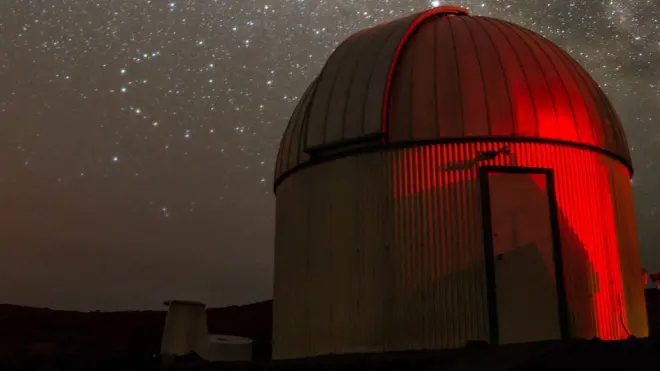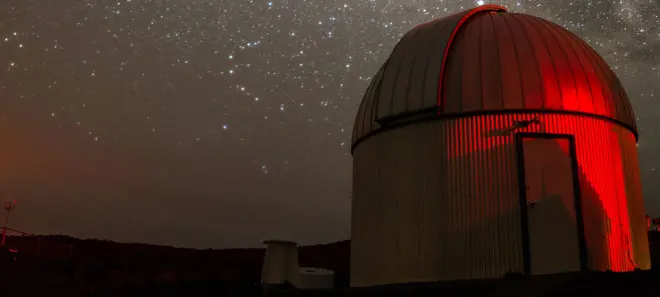英语阅读:通过宇宙了解气候灾难


First Person: Looking to the skies to understand the climate crisis
29 June 2020
Climate Change UN
Could studying the cosmos help us to fight the climate crisis? Two astronomers at the University of Hawaii think that knowledge of the solar system may help to slow down the warming of the Earth’s atmosphere.
cosmos /ˈkɒzmɒs/ n. 宇宙;和谐;秩序;大波斯菊
Astronomer /əˈstrɒnəmə(r)/天文学家
Professor John Tonry leads the NASA-funded ATLAS (Asteroid Terrestrial-impact Last Alert System) project which bills itself as “Earth’s Last Defence.” He works alongside postdoctoral researcher Ari Heinz.
Asteroid /ˈæstərɔɪd/n.小行星;[无脊椎] 海盘车;小游星adj. 星状的
Terrestrial/təˈrestriəl/ adj. 地球的;陆地的,[生物] 陆生的;人间的n. 陆地生物;地球上的人
ATLAS (Asteroid Terrestrial-impact Last Alert System) 小行星陆生撞击最后警报系统
Bill ···as 标榜为···,宣传为·· postdoctoral/ˌpəʊstˈdɒktərəl/ 博士后的
Their work could play an important role in the global debate about climate change and, as a result, contribute to realizing some of the 17 goals Sustainable Development Goals agreed by the global community to reduce poverty and create a sustainable planet.
UN News joined the International Labour Organization on a visit to Hawaii to meet the two astronomers ahead of International Asteroid Day marked annually on 30 June.

John Tonry: I really like big questions; like, where did the universe come from and where is it going? One way to continue answering those types of questions was to create this asteroid survey. Our job is to track asteroid hazards and calculate if and when they will hit Earth. We have the technology to measure these events beautifully. The chances of being hit by an asteroid in the next year is very small, but in the next 100 years, it’s not so small and that could result in many deaths. So, we see an asteroid strike as a low probability but high consequence event.
asteroid hazards:小行星危害 asteroid strike:小行星撞击
Ari Heinz: While most of our surveys focus on larger asteroids that we can see decades, or even a century, before they hit Earth, ATLAS focuses on smaller asteroids, which wouldn't cause global devastation, but which could destroy a city, and which we can only detect when they are close to Earth. If ATLAS discovers that kind of asteroid, then we would treat it like, for example, a hurricane and advise a city or state to evacuate, because there's going to be a big explosion there.
evacuate v. /ɪˈvækjueɪt/(把人从危险的地方)疏散,转移,撤离
JT: 20 years ago, we couldn't purchase the computers we use nowadays, as they were hopelessly expensive. The cameras and telescopes that we're building now simply weren't possible even 10 years ago, and we have developed the software to match the hardware capabilities.
AH: The threat of asteroids although small, certainly motivates me to be careful and try not to miss anything. There's a strange paradox here. We’re sort of laid back in the asteroid community, we're trying hard but we're not under a lot of stress in general, but then we understand that at any moment, we could suddenly be some of the most important people in the world for a short amount of time.
paradox n. /ˈpærədɒks/
1.[ C ] a person, thing or situation that has two opposite features and therefore seems strange 矛盾的人(或事物、情况) •He was a paradox—a loner who loved to chat to strangers. 他真是个矛盾人物,生性孤僻却又喜欢和陌生人闲聊。
2.[ CU ] a statement containing two opposite ideas that make it seem impossible or unlikely, although it is probably true; the use of this in writing 似非而是的隽语;悖论;悖论修辞
JT: Astronomy can play an important role in understanding climate change. It's possible that the sun actually goes through century-long cycles: it’s crucial to understand how the sun behaves, and we have just built a new telescope to look at its surface.
The understanding of planetary atmospheres tells us an awful lot about how climate change can actually run away. ---John Tonry, Astronomer, ATLAS

We can learn from other planets in the solar system where climate change went seriously wrong. Venus was driven to extreme heat by its atmosphere while Mars went the other way and cooled down and now needs a warming atmosphere. So, the understanding of planetary atmospheres tells us an awful lot about how climate change can actually run away.
Venus n. /ˈviːnəs/ 金星,维纳斯 an awful lot :很多
planetary adj. /ˈplænətri/行星的 • a planetary system 行星系
AH: In terms of the future, I see a lot of exciting developments with new telescopes being built and new space missions being launched. There are areas where we can certainly make huge strides forward, for example, asteroids and solar system exploration.
stride /straɪd/ strode
动词 [ V + adv./prep. ] to walk with long steps in a particular direction 大步走;阔步行走;
名词
1.one long step; the distance covered by a step 大步;一步(的距离) •He crossed the room in two strides. 他两大步跨到屋子另一头。
2.your way of walking or running 步态;步伐 •his familiar purposeful stride 他那熟悉而坚定的步伐
3.an improvement in the way sth is developing 进展;进步;发展 •We're making great strides in the search for a cure. 在探索治疗办法方面,我们正不断取得重大进展。
Then there are big questions that are extremely interesting, but may be completely intractable. We have been trying to figure out what dark matter is for 50 years now. We might find out tomorrow, but it's also possible that we'll never find out what it is.
intractable adj. /ɪnˈtræktəbl/ ( of a problem or a person 问题或人 ) very difficult to deal with 很难对付(或处理)的
dark matter:暗物质
JT: Astronomers are in a good position to correct misconceptions about whether climate change is happening or not. The simple answer is “yes,” and that’s what I told my students 30 years ago. The only questions are really, how severe it will be, and how much it will cost to put right. The most important thing for the human race right now is that we absolutely need to deal with it. I think astronomers understand all of this very clearly, and we can also explain it pretty clearly.
原文链接:https://news.un.org/en/story/2020/06/1065712

